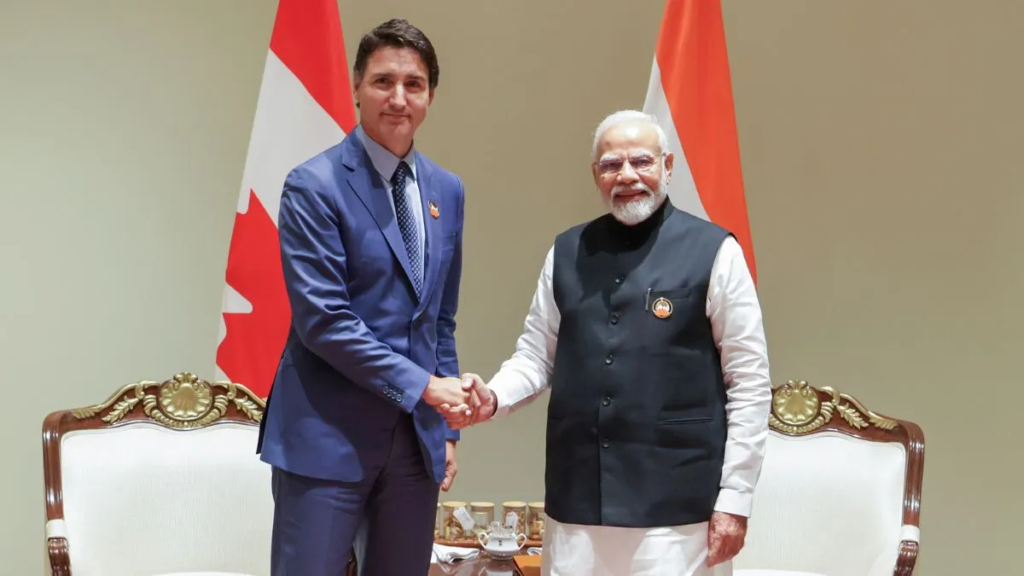Canada Names India in Cyber Threat List for the First Time. In a striking escalation of tensions, Canada has for the first time identified India as a potential cyber adversary in its National Cyber Threat Assessment (NCTA) 2025-2026 report. This report, released by the Canadian Centre for Cyber Security, has placed India alongside other major cyber actors like China, Russia, Iran, and North Korea.
While the document suggests that Indian state-sponsored actors may be involved in cyber espionage against Canada, the accusation has been met with a strong rebuttal from New Delhi.
This latest development further strains the diplomatic relationship between the two countries, which has already been fragile due to Canada’s previous allegations against India regarding the killing of a Sikh separatist leader.
Growing Concerns in Canada’s Cyber Threat Landscape
The National Cyber Threat Assessment (NCTA) 2025-2026 report, released on October 30 by Canada’s Communications Security Establishment (CSE), identifies India as one of the cyber threat adversaries posing a risk to Canada’s national security. In the report, Canada places India fifth in terms of cyber threats, following China, Russia, Iran, and North Korea.
The Canadian Centre for Cyber Security, which prepared the report, is known for analyzing the cyber threat landscape and providing assessments for both government agencies and the public to understand the evolving cyber risks facing Canada.
The report raises concerns about state-sponsored actors from India potentially engaging in cyber espionage against Canadian networks. Specifically, the NCTA 2025-2026 report alleges that Indian cyber actors may be conducting surveillance on Canadian government systems.
Read : Canada PM Trudeau Has Destroyed India-Canada Relationship: Sanjay Verma
This accusation has intensified the friction between the two countries, coming at a time when India and Canada have seen their bilateral relations deteriorate. According to the report, Indian cyber actors are part of a larger “state adversaries” category that includes countries with histories of cyber espionage and attacks on Canadian infrastructure and government networks.
The report also underscores a broader trend of “geopolitically inspired non-state actors” engaging in unpredictable cyber activity, citing pro-India hacktivist groups that allegedly launched brief attacks on Canadian websites.
Read : India Second Biggest Threat to Canada After China: Canadian Panel Report
The inclusion of India in this list marks a significant shift in Canada’s cyber threat perception, as previous editions of the NCTA did not mention India as a cyber adversary. The report points to heightened unpredictability in the cyber landscape, with Canadian officials cautioning that the country could face increased risk from cyber activities driven by geopolitical tensions.
While the report itself refrains from detailing specific incidents, it highlights the potential for espionage by Indian actors. This categorization comes amidst Canada’s intensified focus on national cybersecurity, with the Cyber Centre stressing the importance of protecting both government systems and private sector networks from potential cyber attacks and espionage activities.
India’s Rebuttal and Diplomatic Tensions
India has firmly rejected Canada’s inclusion of it as a cyber threat, dismissing the accusations as baseless. Randhir Jaiswal, a spokesperson for India’s Ministry of External Affairs, described the report as “another example of a Canadian strategy to attack India.” Jaiswal suggested that Canada’s allegations lacked evidence and were part of a larger narrative Canada has been promoting on the global stage to portray India in a negative light.
According to Jaiswal, Canada’s approach to categorizing India as a cyber threat is misleading and does not reflect reality. India argues that the core issue affecting bilateral relations is Canada’s perceived tolerance of pro-Khalistan separatist elements operating within its borders.
India has maintained that these separatist groups, advocating for an independent Sikh state, have openly organized and operated from Canadian soil with minimal interference. In response to allegations of cyber espionage, Indian officials argue that Canada’s stance is an attempt to deflect from its domestic challenges regarding these groups.
The diplomatic rift has worsened in recent months, following the expulsion of six Canadian diplomats from India and the withdrawal of India’s high commissioner and other senior diplomats from Canada.

This tit-for-tat response came after Prime Minister Justin Trudeau accused Indian agents of involvement in the murder of Canadian Sikh leader Hardeep Singh Nijjar in British Columbia. India has strongly denied these accusations, calling them “absurd” and emphasizing its commitment to non-interference in Canada’s internal affairs.
The MEA’s response also highlights the growing frustration within India over what it perceives as Canada’s unwillingness to address the activities of pro-Khalistan supporters. India claims that these groups use Canadian platforms to propagate separatist views and incite violence, which has been a longstanding point of contention.
By categorizing India as a cyber adversary, Canada’s report adds fuel to an already strained relationship, with Indian officials arguing that such accusations are unjustified. This labeling also raises questions about Canada’s intentions, as India insists that there is no concrete evidence supporting the allegations of cyber espionage.
Despite Canada’s stance, India remains firm in its assertion that the real issue lies in Canada’s lenient attitude toward separatist elements rather than any hostile cyber activity by the Indian state.
Implications of the Report for Bilateral Relations and Future Cybersecurity Strategies
The NCTA report’s mention of India signals a challenging period ahead for Indo-Canadian relations, as the two countries now find themselves at odds over cybersecurity allegations in addition to existing political disputes.
The report’s assertions about India reflect a growing wariness in the international community regarding cyber threats, particularly as state and non-state actors alike increasingly leverage digital tools for political purposes.
By naming India, Canada has drawn a clear line, which may influence how other nations perceive India in terms of cyber capabilities and geopolitical motivations. For India, this designation could affect its global image, with potential consequences for partnerships in technology, intelligence, and cybersecurity with countries wary of perceived cyber threats.
Canada’s classification of India as a cyber threat may also influence its cybersecurity strategies and diplomatic posture. Canadian officials are likely to adopt more stringent monitoring of cyber activity attributed to Indian actors and to collaborate more closely with allies on cybersecurity intelligence.
With Canada’s position as part of the Five Eyes intelligence alliance—alongside the United States, the United Kingdom, Australia, and New Zealand—there may be increased collaboration among member nations to monitor and mitigate perceived threats from state-sponsored cyber actors.
This may create additional pressure on India, which has historically pursued independent cyber policies while maintaining close ties with Western allies.

For India, this development could prompt a re-evaluation of its cybersecurity diplomacy. As one of the world’s largest democracies and a significant player in global technology, India has often advocated for an open and secure internet. However, the rising influence of hacktivist groups and the visibility of pro-India groups online may pose challenges for India’s cyber diplomacy efforts.
India may need to engage more proactively with international partners to address concerns about cybersecurity and clarify its position on state-sponsored cyber activities.
On a broader scale, the inclusion of India in Canada’s cyber threat list underscores the increasingly complex interplay between geopolitics and cybersecurity, as countries navigate a landscape where cyber capabilities are critical tools in statecraft.
Canada’s decision to label India as a cyber threat adversary reflects a significant shift in how the two nations view each other in the digital sphere. The report, coupled with existing tensions over political issues, casts a shadow on the prospect of improved bilateral relations in the near future.
As Canada moves to strengthen its cyber defenses, India is likely to respond with heightened scrutiny of Canada’s actions on its own soil. While the NCTA 2025-2026 report aims to safeguard Canadian interests, it has also introduced new complexities in the Indo-Canadian relationship, challenging both countries to navigate a new era of cybersecurity diplomacy amidst existing political tensions.
let’s enjoy few years on earth with peace and happiness….✍🏼🙏

